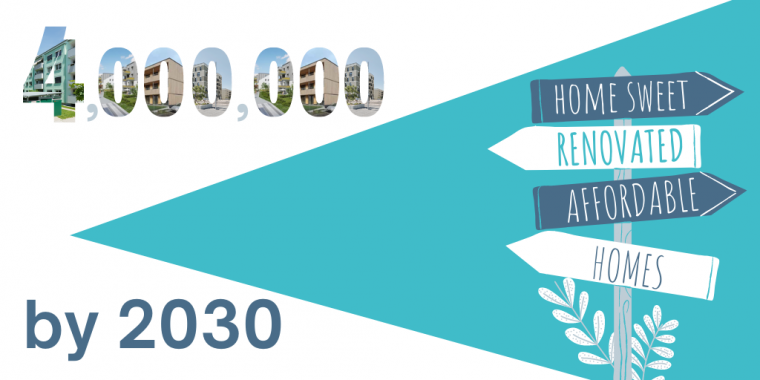Housing Europe's ambition to renovate 4 million affordable homes by 2030
Our President, Bent Madsen released the ambition document during the #Housing2030 conference
Brussels, 10 November 2020 | Published in Energy, Social, Future of the EU & Housing
The mission of cooperative, public and social housing providers is to provide affordable homes in sustainable communities and this work is becoming even more essential now as a result of the economic and social impact of this pandemic.
European Social, Cooperative and Public Housing providers aim at refurbishing 400,000 homes per year or 4 million homes by 2030.
This will decrease the energy consumption of the refurbished housing units on average by 50% by 2030, cut emissions with at least 50% and save up to €700 per year on average to each resident.
Frontrunners in energy efficiency
Social, cooperative and public housing providers are already frontrunners in the fair energy transition: the average energy performance of their homes is better than in any other segment of the housing market and they cater for most of the low-income families thus ensuring comfort at an affordable price.
Our main objective for the Renovation Wave and the Fair Energy Transition is to create and maintain sustainable communities with a high level of quality of life and an affordable cost of living.
The ambition
Social, cooperative and public housing providers aim at spending yearly €35 billion for new buildings and €23 billion for renovation and maintenance.
That would mean renovating in total 4 million homes by 2030 out of the 35 million that the European Commission urges to renovate by this date.
In order to renovate those 4 million homes in Europe by 2030, an extra €13 billion yearly in investments is needed until 2050 on top of the €23 billion of annual investments planned by the social, cooperative and public housing sector.
More jobs, better health
The renovation of 4 million homes would besides contribute to the creation of 1 million jobs, reduction of energy bills of up to €700 per year per household and the saving of health-related costs linked to too cold or too hot homes that could go up to €48 per year per household.
This can only be achieved with the adequate support.
At EU level
Revise State Aid rules in order to allow support to comply with national and EU obligations.
Dedicate part of the revenues of the ETS auctioning of carbon allowances to fund the Renovation Wave and projects, such as the Affordable Housing Initiative, known as the 100 District Renovation.
Simplify access to EIB products and technical assistance for social, cooperative and public housing providers and reduce co-financing requirements.
Support for the shift towards circular economy. The creation of local supply chains for the re-use of building materials coming from the demolition is an important step towards more circular practices. EU R&D programmes, as well as ERASMUS + and the ESF, should be used to develop the necessary solutions and skills to promote circular economy within our sector.
At Member States level
Provide State Aid for energy measures in the social, cooperative, public and affordable housing providers.
Support for social, cooperative and public housing refurbishment activities, in particular as part of the national Recovery Plans in yearly public budget.
Enforce energy savings obligations on energy providers and ensure that part of those obligations will be in the form of setting up a fund for the renovation of social and affordable housing.
Priority for all types of renewable energy supply, especially decentralised PV systems, in accordance with the Renewable Energy Directive, RED II.